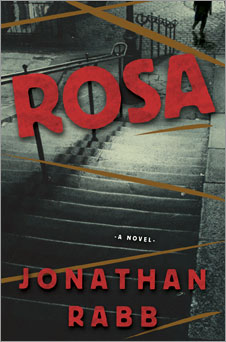Excerpt from Chapter One
Police headquarters were a disaster.
Hoffner hopped out of the ambulance and motioned for the medic to continue driving through the main gate, or at least what was left of it. For a place he had been coming to six days a week for the past eighteen years, it was almost unrecognizable. The once-imposing line of redbrick archways looked ashamed of itself. Four days removed from the final assault, and the crumbling masonry—chalk-white—was doing little to hide the naked slats of wood that pockmarked the façade. Worse were the iron gates that skulked behind, all at wild angles, bent like spoons for a child’s amusement. And along the lower floors, turreted windows peered out blindly from empty sockets, shards of broken glass still clinging to their disfigured panes. Such was the crowning achievement of Alexanderplatz in the wake of revolution.
A trio of soldiers stood lazily by the gate, guns resting on the ground, their collars pulled up tight to fight back the chill. Each sucked on a cigarette, though the tobacco—where they had managed to scavenge that was anybody’s guess—was clearly too harsh for their young lungs. For a fleeting moment Hoffner thought of his own boys, younger still. He would have to teach them how to smoke properly one of these days. None of the soldiers took even a moment’s notice as the ambulance moved past them.
Hoffner had lost track of the different uniforms now strewn about the city—Guard Fusiliers Regiment, Republikanische Soldatenwehr, Section Fourteen of the Auxiliary, so forth and so on—the names and insignia all melding into one another. The majors and colonels who had once led them no longer seemed to matter. These were simply boys with guns in a once-civilized city.
The trouble had all begun quite innocently some ten weeks ago, when the sailors and stokers in Kiel had decided that they, like the great General Ludendorf, had had enough. Ludendorf had fled to Sweden at the end of October. They, unwilling to suffer through another humiliation at the hands of the British, had simply left their ships. On the fourth of November—in a moment of genuine socialist spontaneity—they formed a Workers’ and Sailors’ Council and took their defiance beyond the naval base to the city hall. Naturally, soldiers were sent in to suppress the uprising, but when the boys arrived—for they were mostly boys, after all—they discovered that it was not a wild mob that they had come to destroy, but a group of the dedicated proletariat. And so the soldiers joined them, and the word spread: Munich, Bremen, Hamburg, Dresden, Stuttgart. By the time the Kaiser declared the armistice on the eleventh, Germany was already comfortably ensconced in revolution.
Berlin, of course, was not one to miss out. On the ninth, Karl Liebknecht—son of the late socialist leader Wilhelm, and himself a recent political guest of Luckau prison—took to the streets with a legion of striking workers behind him. They marched under the banner of Spartakus—the new communist party—and declared the birth of the Free Socialist Republic from the balcony of the Royal Palace. Within days, Rosa Luxemburg was with them. She had spent the better part of four years in Breslau prison, her virtual isolation having done nothing to shake her devotion to the cause. There had been rumors—bouts of hysteria, the possibility that little Rosa had slipped off into madness while caged at the far reaches of the Empire—but she showed none of it on her return to Berlin. She had come to take the revolution as far left as humanly possible, and it was there that the real difficulties had begun.


